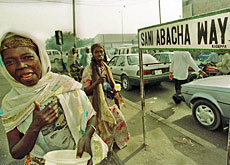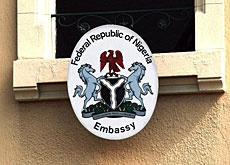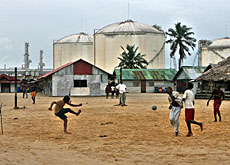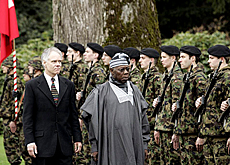Report on Abacha funds receives mixed reaction

The foreign ministry has welcomed a World Bank report on the restitution by Switzerland to Nigeria of funds looted by the late Nigerian dictator, Sani Abacha.
But the Swiss non-governmental organisation Berne Declaration said the report justified its criticism of loopholes in the way the money was returned and used.
The World Bank noted that the funds had been used for development projects but said it had come across gaps in the Nigerian administrative system, particularly concerning budgets and controls on spending.
In a statement on Friday, the foreign ministry said the report had concluded that transparency had been ensured in the restitution of the funds, totalling about $500 million (SFr610 million).
It said Switzerland would continue to pursue a policy of repatriating the illegal assets of politically exposed persons in a “comprehensive, rapid, transparent and comprehensive way”.
The ministry noted that Switzerland was the first and only state to have seized and repatriated the foreign assets of Abacha.
It added that this had been made possible by a judgement of Switzerland’s highest court, which determined that the criminal origin of the funds had clearly been proven without the need for a court procedure to be carried out in the country of origin.
“The study does not find evidence that these funds have been misused or mismanaged,” World Bank economist Victoria Kwawa said.
Agreement
The governments of Nigeria and Switzerland signed an agreement on September 1 last year under which the World Bank was to verify the use of the Abacha funds.
In a statement from the Nigerian capital, Abuja, the World Bank said that of 51 projects reviewed, 23 were completed, 26 were at various stages of completion and two had been stopped.
The report also revealed “considerable remaining weaknesses” in budget recording, reporting and monitoring in Nigeria, but noted the government had recently launched several initiatives to address the problems.
The Berne Declaration said the report confirmed its view that the restitution process had gone wrong because it had been wrongly planned.
The NGO’s Andreas Missbach told the Swiss news agency that Switzerland should have insisted from the beginning that the restitution be linked to control mechanisms, and the projects to be financed should have been defined beforehand.
“We simply do not know how many of the Abacha millions actually benefited the population,” he said.
Many mistakes
Missbach added that many mistakes could have been avoided if Nigerian civil society had been involved from the outset.
The World Bank report notes that the repatriated Abacha funds were spent in five sectors: power, roads, health, education and water.
It said the monitoring survey revealed little public awareness of the programme, with 98 per cent of respondents not knowing that the projects under review had benefited from recovered Abacha funds.
It added that creating greater awareness of the programme – the sources of funding and progress in implementation – could have helped Abuja raise the profile of its anti-corruption drive and demonstrate clearly to Nigerians the benefits from good use of the repatriated finds.
swissinfo with agencies
Between 1993 and 1998, Sani Abacha is said to have plundered more than $2.2 billion from the coffers of Nigeria.
About $700 million was frozen in Switzerland in 1999.
More than $200 million of that amount was returned to Nigeria in a first payment in December 2003.
The Swiss Federal Court decided in February 2005 that a further $458 million should be returned.
The World Bank confirmed in September 2005 that Switzerland had repatriated a further $290 million.
In November 2005, Switzerland announced the restitution of the last tranche of the funds blocked in Switzerland, totalling $170 million.
The World Bank report said the repatriation of the Abacha funds represented an “important milestone” in Nigeria’s fight against corruption, and the first time that looted funds had been returned to an African country.
The monitoring was undertaken as part of a larger review of expenditures of the public expenditure and public financial management in Nigeria.
It noted that Nigerian civil society organisations played an integral role in field visits to 51 randomly selected projects, where 168 people were interviewed, including those involved in project development and potential project beneficiaries.

In compliance with the JTI standards
More: SWI swissinfo.ch certified by the Journalism Trust Initiative



You can find an overview of ongoing debates with our journalists here. Please join us!
If you want to start a conversation about a topic raised in this article or want to report factual errors, email us at english@swissinfo.ch.